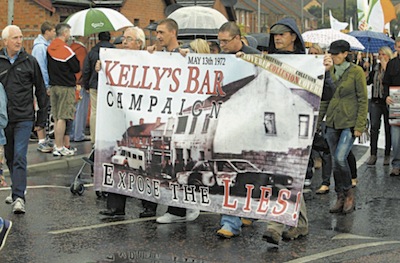
The police ombudsman Michael Maguire has been asked to investigate a bombing and shooting incident of the early years of the recent conflict that bears strong similarities to the McGurk’s bar atrocity.
Kelly’s bar, at the junction of the Whiterock Road and Springfield Road, in west Belfast, was targeted by a loyalist paramilitary death squad in May 1972.
Relatives of those killed and injured in the attack have discovered that the same UVF team with links to loyalist informer Robert Campbell -- the only person ever convicted in relation to the McGurk’s attack, in which 15 people were killed -- was never investigated properly despite being linked to the bombing.
At the time, in a replica of what happened after the McGurk’s bar attack, the then British governor William Whitelaw told the House of Commons the bombing had been a result of an IRA ‘own goal’ -- despite it being clear the attack had been orchestrated by the UVF.
Ciaran MacAirt discovered that UVF members arrested on the night of the Kelly’s bar bombing were linked later to both attacks.
Mr MacAirt has written a book about the McGurk’s bar bombing which killed his grandmother Kitty Irvine.
“The similarities between McGurk’s and Kelly’s are clear to see,” he said.
“Customers of the bar were criminalised yet again.
“Army, police and governmental black propaganda was almost word for word the same as they were written to the same information policy theme.”
On the day of the Kelly’s bar bombing the pub was packed with people watching a soccer match between England and Germany.
The explosion injured 63 people, eight of them seriously. As the rescue operation got under way a loyalist gunman opened fire from the nearby Springmartin estate. Thirty shots were fired and ambulance crews dodged bullets to try to get to the injured.
Barman Tommy Mcllroy was shot in the chest by loyalists as he helped dig through the rubble of the blast in a search for survivors.
A second barman John Moran died a week later from injuries sustained in the blast. In the aftermath of the attack loyalists, the IRA and British army became involved in a three-way gun battle.
British soldiers based at the Henry Taggart army barracks opened fire and killed Robert McMullan, a 32-year-old father-of-four, as he walked along New Barnsley Park.
Alan Buckley, a 22-year-old British soldier, was shot dead by the IRA as he sat in the turret of an armoured vehicle in Turf Lodge. A l5-year-old schoolboy Michael Magee was discovered in New Barnsley Crescent, shot in the chest.
The three-way gun battle raged for more than 14 hours with more than 1,000 rounds of ammunition fired.
Later a west Belfast Catholic Gerard McCusker was found beaten and shot in Hopeton Street off the Shankill, apparently killed and robbed by the loyalist UDA.
Lawyer Padraig O Muirigh, who represents some of the Kelly’s bar families, said the RUC had deliberately mismanaged any serious investigation into the bombing.
“No lines of inquiry were ever followed other than those that misdirected the focus of the investigation towards the ‘republican own goal’ theory,” he said.
“The Kelly’s bar families have requested that the police ombudsman conduct an independent investigation into the obvious failings of the original RUC investigation into this matter”.
BALLYMURPHY DEMANDS TRUTH
Meanwhile, more than 1,000 people took part in a ‘Time for Truth’ march organised by members of the Ballymurphy massacre families to commemorate the anniversary of the deaths of 11 people shot dead by the British army in August 1971.
The march through Ballymurphy in west Belfast was attended by survivors of the Kelly’s bar attack, as well as by representatives of the McGurk’s bar campaign and Bloody Sunday families.
The rally was addressed by Eileen McKeown, whose father Joseph Corr was killed by the Parachute Regiment in Ballymurphy.
She criticised British Direct Ruler Owen Paterson who said recently that a public inquiry into the atrocity would not be in the public interest
“If the same thing happened in his home town of Whitchurch in England, immediately it would have been a murder inquiry,” she said.
The rally’s organiser John Teggart, whose father was one of those who died in the shootings, which occurred over several days in August 1971, said that was not the case.
“We are dedicated to clear my daddy’s name. He was branded a gunman -- he is totally innocent,” he said.
“He was shot 14 times in the back and leg and thigh, so that’s what needs dealt with and the Government needs to start talking to Ballymurphy families.” The victims were killed by paratroopers during Operation Demetrius, which was the start of internment without trial.
The Ballymuphy relatives have been supported in their quest for an inquiry by Bloody Sunday families.
John Kelly, whose brother Michael was shot dead on Bloody Sunday, organised a bus for supporters to travel from Derry to the rally.
He said: “Just as they wholeheartedly supported us during our quest for truth and justice, it is imperative that the people of Derry now show support for the families in Ballymurphy, who are still waging their own struggle for truth and justice.”
![[Irish Republican News]](https://republican-news.org/graphics/title_gifs/rn.gif)
![[Irish Republican News]](https://republican-news.org/graphics/title_gifs/harp.gif)

